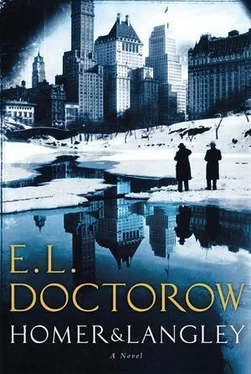HOW LONG MARY ELIZABETH lived with us I don’t quite remember but when I was fired from my job at the little movie theater on Third Avenue — the talkies had come along, you see — Langley and I sat down and agreed there was no call to keep her with us anymore — really it was more for our sake that we came to this decision — and allotting the necessary sums from our diminishing resources, we sent her off to the Sisters of Mercy Junior College in Westchester County, where she would study music and French and moral philosophy and whatever other educative things would assure her of a better existence. She was grateful and not too sad, having learned from her grandmother that as an orphan she should expect to be trundled off from one institution to another in hopes someday of finding a permanence that would answer her prayers.Her gentle touch at the piano was something I should not have questioned. She was feeling her way through music as through life, a parentless child trying to regain a belief in a reasonable world. But she did not make others feel sad for her, nor did she allow herself to be as self-involved as she had every right to be. She was staunchly cheerful. When we had walked together to the theater, she held my arm as if I was escorting her as a man escorts a woman. She matched her gait to mine, as people do when they are couples. She knew I was proud of my ability to get around town and when I made a mistake, intending to cross the street at the wrong time, or stepping on someone’s heels — because I tended to walk with the assurance of a sighted person — she would stop me or steer me with the slightest pressure of her hand. And she would say something as if what had just transpired had not happened at all. That Buster, she would say — as if she hadn’t heard the horn that had blown or the driver who had cursed — that Buster, he’s so funny. He gets into these scrapes and just barely escapes with his life and the expression on his face never changes. And you know he loves the girl and doesn’t know what to do about it. That’s so sweet and dopey. I’m glad it’s still playing. I could watch it forever. And you play just the right accompaniment, Uncle Homer. He should come down from the screen and shake your hand, I mean it.
I CANNOT AT THIS moment bear to speak of what became of Mary Elizabeth Riordan. Not a night passes that I don’t recall how, when she was going off to school, we all stood with her on the sidewalk waiting for a taxicab that would take her and her one suitcase to Grand Central Terminal. I heard a cab pull up and everyone saying goodbye, Langley clearing his throat and Siobhan who cried, and Mrs. Robileaux blessing her from the doorway at the top of the steps. They told me how lovely Mary looked in the smart tailored coat that had been our gift. She was hatless on this chilly sunny September morning. You could feel both the warmth and the breeze blowing through it. I touched her hair and felt soft wisps of it lifting. And when I took her face in my hands — the lovely thin face and resolute chin, her temples with their soft and steady pulse, the slim straight nose and her soft smiling lips — she took my hand and kissed it. Goodbye, goodbye, I whisper to myself. Goodbye, my love, my girl, my dear one. Goodbye. As if it is happening at this moment.
BUT MEMORIES ARE not temporally driven, they detach themselves from time, and all of that was much later than our recklessly spendthrift years when Langley and I went out almost every night to one nightclub or another where ladies with rolled stockings and short skirts sat on your lap and blew smoke in your face and surreptitiously felt along the inside of your thigh to see what you had there. Some of the clubs were rather elegant, with a pretty good kitchen and a dance floor, others were basement dives where the music came from a radio on a wall shelf broadcasting some swing orchestra from Pittsburgh. But where you went didn’t matter, you could die of the gin in any of these joints, and the mood was the same everywhere, people laughing at what wasn’t funny. But it felt good to establish yourself in this or that club, to be let in the door and be greeted like someone important. In these peculiar nights of Prohibition, the law only had to say No Drinking to get everybody plastered. Langley said the speakeasy was the true democratic melting pot. And it was true, at this one club, the Cat’s Whiskers, I became friendly with a gangster who said to call him Vincent. I knew he was the real thing because when he laughed other men at the table laughed with him. He was very interested in my sightlessness, this Vincent. What’s it like without eyes, he said. I told him it wasn’t so bad, that I made up for it other ways. How, he said. I told him that when I had a few drinks I regained something like vision. In fact I believed this. I knew I was hallucinating, I was seeing all right but into my own mind of thought and impression as I generated visions from what I learned from my other senses and added, by way of detail, my judgments of character and my attraction to this one or revulsion for that one. Of course when you’re sober you make the same deductions, I know that, but at these times my brain synapses firing with the fumes of alcohol, a clarity of organized impressions amounted to a kind of vision. Naturally I didn’t go into all that, I just said that with a lot of noise and music and booze, of course, and cigarette smoke heavy enough to float in, I could make shadows out pretty well.How many fingers am I holding up, he said. None, I said. I knew that old trick. He chuckled and slapped me on the shoulder. This bozo’s smart, he said. He had a thin whispery voice, tuneless except for a whistle that ran along the top of it as if one of his lungs had sprung a leak. He lit a match and held it up to my face to see the clouds in my eyes. He asked me to describe what he looked like. I reached out to touch his face and one of his henchmen yelled and grabbed my wrist. We don’t do that, he said. It’s okay, letim, Vincent said and so I touched his face, and felt sunken cheeks with pockmarks, a sharp recessive chin, a beaky nose, the head widening at the top and thick wavy wetted hair that rose back from a widow’s peak like feathers. He was all hunched over to accommodate me and I thought of a hawk maybe dressed in a suit and a shirt with cuff links. I told him that and he laughed.It was exciting talking to him like he was a normal person — sitting and chatting with someone you knew had no regard for the life of anyone he might disagree with. I found it to be true generally with the criminals we ran into that as a class they were extremely sensitive. The thought that I might inadvertently offend Vincent was exhilarating and made me careless of what I said. But showing no deference turned out to be the right way to deal with him. And I didn’t ask questions, I didn’t ask him as you might, with a normal person, what he did, what his profession was. It didn’t matter, did it? Whatever it was it made him a gangster. This was the kind of excitement Langley and I looked for when we went out in those days and were still expecting a return from social life. It was like what a lion tamer must feel when the beast is sitting on its stool but at any moment might leap for his throat. Vincent kept plying me with drinks. I was one of his entertainments, a blind man who could see. He was in effect holding court because people came over to say hello. A woman he knew took up residence on his lap, and so he had a new diversion. I could smell them both in all their glory, his cigar, her cigarette, the pomade on his hair, her gin reek. Her abrupt silences in mid-sentence told me he had his hand up her dress. Around me the noise was instructive. This was an elegant club for a speakeasy, it had a lively if predictable dance orchestra, a lot of bounce, the rhythm section predominating, a banjo, a string bass. The music was fast and mechanical though the dancers didn’t seem to mind, they hopped and stomped about, their feet thumping the floor on the downbeat. But also glasses were breaking, and the occasional shout and scuffle indicated to me the place might blow at any time. And there was always the possibility of a police raid though probably not with such as Vincent in the room. And then this girl who had settled on his lap, after a while I heard her say, You gotta stop that, honey. Oowheee, she said, or else. Or else what, babe, he said. Or else come to the Ladies’ with me, she said.Yes. I do remember that particular evening. When Langley and I said good night, my new friend Vincent had his car take us home. It was quite a car too, with a deep growl of a motor and plush seats and a man sitting up front next to the driver in some gangland equivalent of livery.The car pulled up in front of our door and after we got out it idled there for a long minute before it drove off. Langley said, Well that was a mistake. We stood at the top of the stoop. It must have been three in the morning. I had had a good time. The air was brisk. It was sometime early in the spring. I could smell the budding trees across the street in the park. I breathed in deeply. I felt strong. I was strong, I was young and strong. I asked Langley why it was a mistake. I don’t like it that now those scum know where we live, Langley said.
Читать дальше












